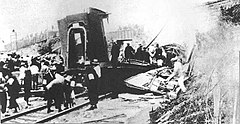 Huanggutun Railway Station shortly after the explosion. | |
| Native name | 皇姑屯事件 |
|---|---|
| English name | Huanggutun incident |
| Date | 4 June 1928 |
| Time | 5:23 a.m. (UTC +08:00) |
| Venue | A bridge near Huanggutun Railway Station |
| Location | Shenyang, Republic of China |
| Cause | Bomb |
| Motive | The desire to install a pro-Japanese leader in Manchuria |
| Target | Zhang Zuolin |
| Organized by | Colonel Daisaku Kōmoto of the Kwantung Army |
| Participants | Captain Kaneo Tōmiya First Lieutenant Sadatoshi Fujii |
| Outcome | Death of Zhang Zuolin Failure to destabilize Northeast China |
| Casualties | |
| Zhang Zuolin | |
| Wu Junsheng | |
The Huanggutun incident (Chinese: 皇姑屯事件; pinyin: Huánggū Tún Shìjiàn), also known as the Zhang Zuolin Explosion Death Incident (Japanese: 張作霖爆殺事件, Hepburn: Chōsakurin bakusatsu jiken), was the assassination of the Fengtian warlord and Generalissimo of the Military Government of China Zhang Zuolin near Shenyang on 4 June 1928.
Zhang was killed when his personal train was destroyed by an explosion at the Huanggutun Railway Station that had been plotted and committed by the Kwantung Army of the Imperial Japanese Army. Zhang's death had undesirable outcomes for the Empire of Japan, which had hoped to advance its interests in Manchuria at the end of the Warlord Era, and the incident was concealed as "A Certain Important Incident in Manchuria" (満州某重大事件, Manshu bou judai jiken) in Japan. The incident delayed the Japanese invasion of Manchuria for several years until the Mukden Incident in 1931.